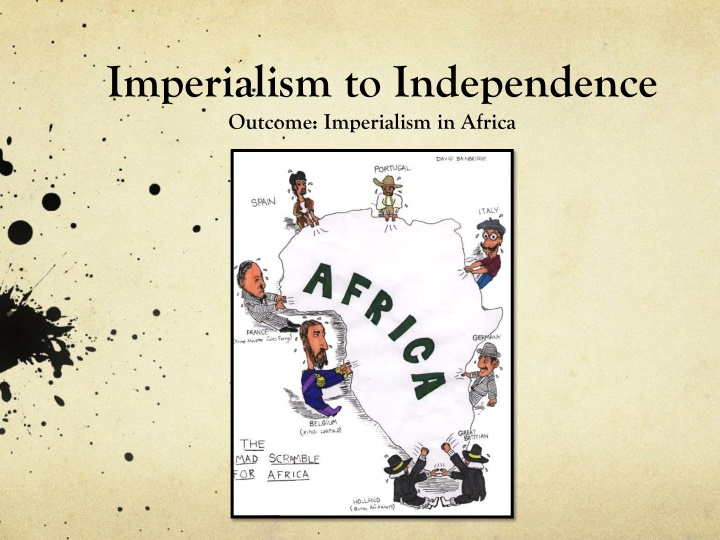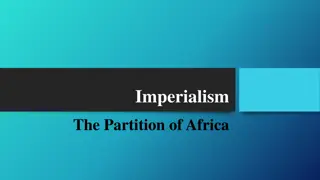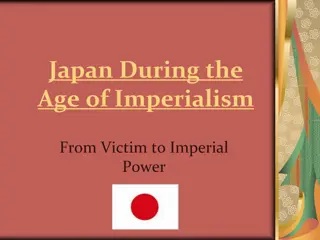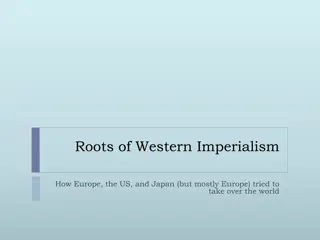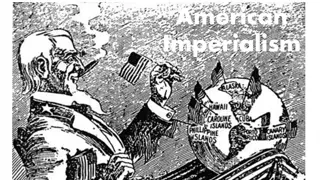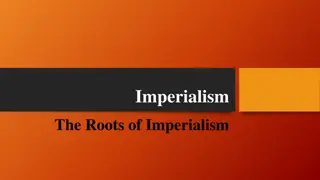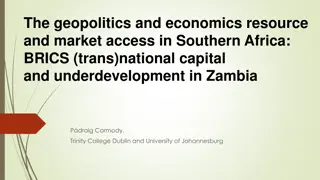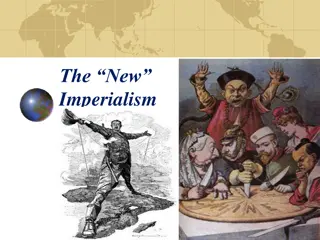The Age of Imperialism in Africa: From Imperialism to Independence
The Age of Imperialism in Africa delves into the historical background of European domination, exploring factors such as European motives, societal impact, and the spread of Social Darwinism. It covers the transition from African trade in the 15th to 17th centuries to the eventual independence movements in Africa. The narrative unfolds with European nationalism driving colonization, missionaries spreading Christianity, and the exploitation of African lands for raw materials. The clash of civilizations, intertwined with cultural, economic, and political complexities, paints a vivid picture of imperialism's lasting legacy in Africa.
Uploaded on Dec 15, 2024 | 1 Views
Download Presentation

Please find below an Image/Link to download the presentation.
The content on the website is provided AS IS for your information and personal use only. It may not be sold, licensed, or shared on other websites without obtaining consent from the author.If you encounter any issues during the download, it is possible that the publisher has removed the file from their server.
You are allowed to download the files provided on this website for personal or commercial use, subject to the condition that they are used lawfully. All files are the property of their respective owners.
The content on the website is provided AS IS for your information and personal use only. It may not be sold, licensed, or shared on other websites without obtaining consent from the author.
E N D
Presentation Transcript
Imperialism to Independence Outcome: Imperialism in Africa
The Age of Imperialism in Africa 1. Setting the Stage: Layers of History a. Ancient Egyptians and Nubians in the north left Africa with impressive ruins b. Rule by the Persians and Greeks spread culture c. The Ottoman Empire brought Islam d. The Roman Empire controlled northern Africa after the defeat of Carthage
European Nationalism Source for Raw Materials Missionary Activity Industrial Revolution European Motives For Colonization Markets for Finished Goods Military & Naval Bases Social Darwinism Places to Dump Unwanted/ Excess Popul. European Racism Humanitarian Reasons Soc. & Eco. Opportunities White Man s Burden
The Age of Imperialism in Africa a. Prior to European domination, African people were divided into hundreds of ethnic and linguistic groups and continued to follow traditional beliefs b. Some converted to Islam and Christianity c. Due to industrialization, Europeans competed for new markets to buy goods d. This led to European imperialism in Africa in the 19th and 20th centuries e. Imperialism: the seizure of a country or territory by a stronger country f. Disease and African armies had discouraged European exploration in the past
Continued. a. Humanitarians, explorers, and missionaries who were against the Atlantic Slave Trade were allowed to travel to the interior b. In the 1860s, David Livingstone, a missionary from Scotland travelled to Africa c. Feared dead, American Henry Stanley found Livingstone in near Lake Tanganyika and his greeting Dr. Livingstone, I presume? became world famous d. Stanley s further exploration of the Congo sparked the interest of King Leopold II of Belgium who took control of these lands with treaties and exploited the people
The Age of Imperialism in Africa 3. Social Darwinism a. National pride led to the desire for more colonies b. Europeans viewed an empire as a measure of national greatness c. Simply put: Europeans believed they were better than other peoples; racism d. Based on Charles Darwin s Survival of the Fittest, European attitudes were a reflection of a social theory known as Social Darwinism e. Essentially they believed those who were the fittest for survival enjoyed wealth and success and were considered superior to others f. This colonization push also came from missionaries looking to spread Christianity g. Railroads, maxim gun, and quinine for malaria helped Europeans push into Africa
Africa 1890
The Age of Imperialism in Africa 4. The Berlin Conference a. The discovery of diamonds in 1867 and gold in 1886 in South Africa increased European interest in colonization b. To prevent war, 14 European nations met at the Berlin Conference in 1884-85 to lay down rules for the division of Africa c. They agreed that any European nation could claim land by notifying other nations and showing they could control that land d. Very little thought was given to how the African groups would react e. No African ruler was invited f. By 1914, only Liberia and Ethiopia remained free of European control
Africa in 1914
The Age of Imperialism in Africa 5. Clash over South Africa a. The Zulus under leader Shaka fought bravely against the British b. Zulus almost win but the Zulu nation fell to Britain in 1887 c. Dutch settlers known as Boers settled the Cape of Good Hope in 1652 d. Fought the British when the British took over e. Led to the Boer War between the British and the Boers f. Britain finally won and created the Union of South Africa in 1910
The Age of Imperialism in Africa Legacy of Colonial Rule a. Negative Effects i. Africans lost control of their lands and their independence ii. Many died of smallpox iii. Thousands died resisting European rule iv. Traditional culture broke-down v. Division of Africa combined or unnaturally divided groups vi. Valuable goods such as gold, salt, and diamonds were taken out of the continent as well as the profit that was made 6.
The Age of Imperialism in Africa b. Positive Effects i. Reduced local warfare ii.Sanitation was provided; hospitals & schools built iii.Lifespans and literacy rates increased iv. Railroads, dams, and telephone/telegraph wires were built; mostly benefitted Europeans
Constructive Response Questions 3. Describe what the European motivations for colonizing Africa were:
Scramble for Africa Rudyard Kipling: Writer that wrote stories and poems about men going to Africa and conquering the land. (Wrote the Jungle Book) Henry Stanley: Reporter hired to find Livingstone who was a missionary that travelled to central Africa to promote Christianity and was later commissioned to obtain land in the Congo
Scramble For Africa King Leopold II: Claimed he wanted to establish colonies that abolished the slave trade and would promote Christianity Otto Von Bismark: Ran the Berlin Conference and took the first colony
Scramble For Africa Social Darwinism: those who were the fittest for survival enjoyed wealth and success and were considered superior to others. Non euro were considered to be on a lower scale of culture and development. Berlin Conference: layed down the rules of dividing Africa. Any European could claim land if it could show it had control No Africans were allowed to attend.
Did European imperialism seek to make the lives of Africans better? Why or why not? What evidence is there for your opinion?
